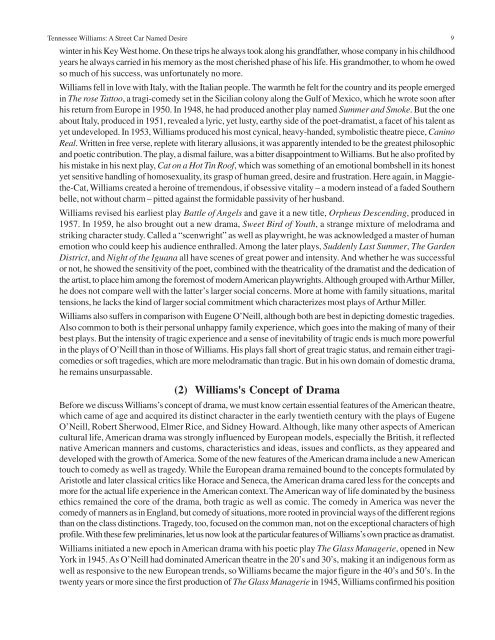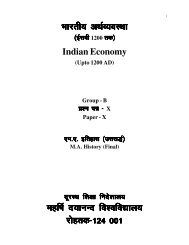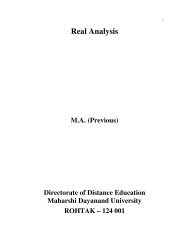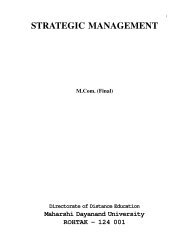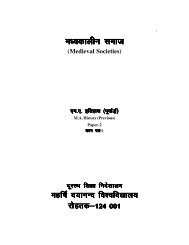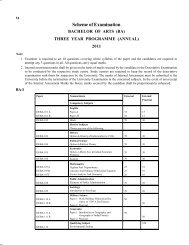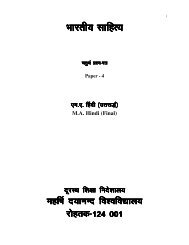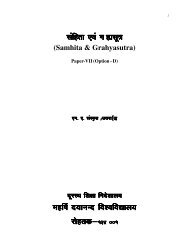LITERATURE AND GENDER - Maharshi Dayanand University, Rohtak
LITERATURE AND GENDER - Maharshi Dayanand University, Rohtak
LITERATURE AND GENDER - Maharshi Dayanand University, Rohtak
You also want an ePaper? Increase the reach of your titles
YUMPU automatically turns print PDFs into web optimized ePapers that Google loves.
Tennessee Williams: A Street Car Named Desirewinter in his Key West home. On these trips he always took along his grandfather, whose company in his childhoodyears he always carried in his memory as the most cherished phase of his life. His grandmother, to whom he owedso much of his success, was unfortunately no more.Williams fell in love with Italy, with the Italian people. The warmth he felt for the country and its people emergedin The rose Tattoo, a tragi-comedy set in the Sicilian colony along the Gulf of Mexico, which he wrote soon afterhis return from Europe in 1950. In 1948, he had produced another play named Summer and Smoke. But the oneabout Italy, produced in 1951, revealed a lyric, yet lusty, earthy side of the poet-dramatist, a facet of his talent asyet undeveloped. In 1953, Williams produced his most cynical, heavy-handed, symbolistic theatre piece, CaninoReal. Written in free verse, replete with literary allusions, it was apparently intended to be the greatest philosophicand poetic contribution. The play, a dismal failure, was a bitter disappointment to Williams. But he also profited byhis mistake in his next play, Cat on a Hot Tin Roof, which was something of an emotional bombshell in its honestyet sensitive handling of homosexuality, its grasp of human greed, desire and frustration. Here again, in Maggiethe-Cat,Williams created a heroine of tremendous, if obsessive vitality – a modern instead of a faded Southernbelle, not without charm – pitted against the formidable passivity of her husband.Williams revised his earliest play Battle of Angels and gave it a new title, Orpheus Descending, produced in1957. In 1959, he also brought out a new drama, Sweet Bird of Youth, a strange mixture of melodrama andstriking character study. Called a “scenwright” as well as playwright, he was acknowledged a master of humanemotion who could keep his audience enthralled. Among the later plays, Suddenly Last Summer, The GardenDistrict, and Night of the Iguana all have scenes of great power and intensity. And whether he was successfulor not, he showed the sensitivity of the poet, combined with the theatricality of the dramatist and the dedication ofthe artist, to place him among the foremost of modern American playwrights. Although grouped with Arthur Miller,he does not compare well with the latter’s larger social concerns. More at home with family situations, maritaltensions, he lacks the kind of larger social commitment which characterizes most plays of Arthur Miller.Williams also suffers in comparison with Eugene O’Neill, although both are best in depicting domestic tragedies.Also common to both is their personal unhappy family experience, which goes into the making of many of theirbest plays. But the intensity of tragic experience and a sense of inevitability of tragic ends is much more powerfulin the plays of O’Neill than in those of Williams. His plays fall short of great tragic status, and remain either tragicomediesor soft tragedies, which are more melodramatic than tragic. But in his own domain of domestic drama,he remains unsurpassable.(2) Williams's Concept of DramaBefore we discuss Williams’s concept of drama, we must know certain essential features of the American theatre,which came of age and acquired its distinct character in the early twentieth century with the plays of EugeneO’Neill, Robert Sherwood, Elmer Rice, and Sidney Howard. Although, like many other aspects of Americancultural life, American drama was strongly influenced by European models, especially the British, it reflectednative American manners and customs, characteristics and ideas, issues and conflicts, as they appeared anddeveloped with the growth of America. Some of the new features of the American drama include a new Americantouch to comedy as well as tragedy. While the European drama remained bound to the concepts formulated byAristotle and later classical critics like Horace and Seneca, the American drama cared less for the concepts andmore for the actual life experience in the American context. The American way of life dominated by the businessethics remained the core of the drama, both tragic as well as comic. The comedy in America was never thecomedy of manners as in England, but comedy of situations, more rooted in provincial ways of the different regionsthan on the class distinctions. Tragedy, too, focused on the common man, not on the exceptional characters of highprofile. With these few preliminaries, let us now look at the particular features of Williams’s own practice as dramatist.Williams initiated a new epoch in American drama with his poetic play The Glass Managerie, opened in NewYork in 1945. As O’Neill had dominated American theatre in the 20’s and 30’s, making it an indigenous form aswell as responsive to the new European trends, so Williams became the major figure in the 40’s and 50’s. In thetwenty years or more since the first production of The Glass Managerie in 1945, Williams confirmed his position9


